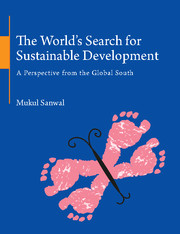Book contents
- Frontmatter
- Dedication
- Contents
- Preface
- Acknowledgments
- Abbreviations
- INTRODUCTION
- 1 Social Dimension of Sustainability
- CONSUMPTION IN AN UNEQUAL WORLD: FRAMING INTERNATIONAL COOPERATION
- CLIMATE POLICY: GLOBAL TO NATIONAL
- SUSTAINABLE DEVELOPMENT: NATIONAL TO GLOBAL
- 12 Conceptual and Institutional Foundation
- 13 Politics within the United Nations
- 14 Limitations of the Building Blocks of Sustainability
- 15 Use of Natural Resources
- 16 Distribution of Natural Resources
- CONSUMPTION IN A MORE EQUAL WORLD: SHAPING SOCIETAL FUNCTIONS
- GEOPOLITICS TO GEOECONOMICS: RURAL–URBAN DIVIDE, RATHER THAN BETWEEN COUNTRIES
- THE ASIAN CENTURY
- Index
12 - Conceptual and Institutional Foundation
from SUSTAINABLE DEVELOPMENT: NATIONAL TO GLOBAL
Published online by Cambridge University Press: 18 December 2015
- Frontmatter
- Dedication
- Contents
- Preface
- Acknowledgments
- Abbreviations
- INTRODUCTION
- 1 Social Dimension of Sustainability
- CONSUMPTION IN AN UNEQUAL WORLD: FRAMING INTERNATIONAL COOPERATION
- CLIMATE POLICY: GLOBAL TO NATIONAL
- SUSTAINABLE DEVELOPMENT: NATIONAL TO GLOBAL
- 12 Conceptual and Institutional Foundation
- 13 Politics within the United Nations
- 14 Limitations of the Building Blocks of Sustainability
- 15 Use of Natural Resources
- 16 Distribution of Natural Resources
- CONSUMPTION IN A MORE EQUAL WORLD: SHAPING SOCIETAL FUNCTIONS
- GEOPOLITICS TO GEOECONOMICS: RURAL–URBAN DIVIDE, RATHER THAN BETWEEN COUNTRIES
- THE ASIAN CENTURY
- Index
Summary
The evolution of sustainable development over a 40-year period is characterized by periodic development of new intellectual frameworks, institutions and rules around prioritizing issues related to demand for natural resources, ecosystem services, energy use within planetary limits and urbanization. There is now a new dimension to the global concern, which was first defined in terms of giving priority to global environmental change, then as climate change and later as sustainable development. Increasing consumer demand from the shift of rural populations to cities led by the re-emergence of China and India is now shifting economic growth, geopolitics and science from considering scarcity to considering the use and distribution of natural resources in cities. This transformation is not based on negotiated outcomes at the multilateral level, but rather seeks to modify patterns, trends and drivers of natural resource use.
The need for international cooperation to respond to the global environmental consequences of natural resource use, or rights to global commons, was first recognised in 1972, evolved in terms of enhancing services provided by the ecosystem, or biodiversity and related biotechnology, in 1992, and the ‘sink’ constraints of the planet have now taken natural resource scarcity to a new dimension, for keeping within the carbon budget. These shifts highlight the interdependencies of a globalized society in using natural resources for providing development opportunities for all people and their shift to cities. The various mechanisms evolved through global negotiations to deal with natural resources fall short because they are not located within a larger debate on dealing with human well-being and instead focus only on limiting damage, and ignore distribution in the context of scarcity. Globalization makes clear that the United Nations is best placed to support a common understanding on patterns of resource use that are in principle common for all by generating strategic knowledge, and will lead to deepening coherence of the future global agenda.
Dimensions of universalism
The Charter, of the United Nations, agreed in 1945, assigns governments a responsibility to work for peace, freedom, human rights and social and economic progress for all people, but is silent on the role of environmental issues in achieving these goals.
- Type
- Chapter
- Information
- The World's Search for Sustainable DevelopmentA Perspective from the Global South, pp. 169 - 178Publisher: Cambridge University PressPrint publication year: 2015

